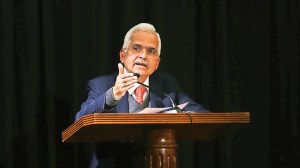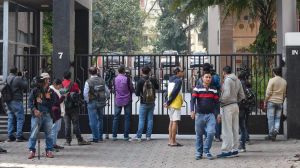Evergrowth case refuses to die
New Delhi, Nov 17: Several months after the telecom ministry's bureaucrats refused to restore the license of Punjab cellular license holde...

New Delhi, Nov 17: Several months after the telecom ministry8217;s bureaucrats refused to restore the license of Punjab cellular license holder Evergrowth despite both the minister of state and the minister being in favour of it, the Evergrowth case has got a fresh lease of life. The case was referred to the law ministry a few days ago, in the hope of getting a favourable response this time 8212; as early as six months ago, the Attorney General had ruled against Evergrowth, though it remains to be seen what his ruling will be when the case is put up to him again.
Evergrowth8217;s license had been terminated for non-payment of dues 8212; this includes Rs 218 crore of so-called disputed8217; license fees. Evergrowth argued that it did not need to make this payment since it represented the license fee for a period of 693 days during which the company8217;s license had been terminated by the government. The ministry of telecom, and the Attorney General, however, had earlier argued that this was not true 8212; that Evergrowth8217;s license had never been terminated in the period 1996 to 1998, but that it had not been allowed to operate the license since it had not paid the requisite license fee dues.
In August, based on pretty detailed arguments by his deputy Tapan Sikdar, telecom minister Ram Vilas Paswan had argued that Evergrowth8217;s license be restored immediately, since the opinion of the Law Ministry and the AG may, however, take some time.8217;
Both Sikdar and Paswan have argued that the disputed8217; amount be set aside 8212; that Evergrowth just pay the balance Rs 197 crore 8212; for the time being, and Evergrowth8217;s license be restored. The disputed amount is to be referred to the Appellate Tribunal of the Telecom Regulatory Authority of India. The Appellate Tribunal, interestingly, has still not been set up, and it is an open question as to when it will be set up, and when the Evergrowth case will be heard.
A group which is following the Evergrowth case with great attention is the Rai8217;s of Koshika. Four of their celluar licenses have been cancelled for non-payment of dues, and the group8217;s argument is that if Evergrowth can get its license revived, then so can theirs. Koshika has also argued that they be allowed to pay the license fee dues for at least one circle and have this restored, instead of being asked to pay the dues for all the circles. Koshika says that this practice of not linking all dues from various circles was followed in the case of JT Mobiles which was bought by Sunil Mittal. Mittal paid the dues of Karnataka and Andhra Pradesh and had these licenses revived, but was not forced to pay the dues for the Punjab circle.
More delays plague telecom PSUs
The saga of delays in deciding on tenders continues to plague the telecom PSUs like MTNL and the newly-created Bharat Sanchar Nigam Limited BSNL.
Five months after it first floated a tender for 5 lakh switches, MTNL has now cancelled the tender, and the file on the new tender continues to do the rounds in the telecom ministry. MTNL floated a tender in July, and was offered a price of Rs 3,400 per switch. But since the DoT got a bid of Rs 1,990 when it bid for switches, MTNL told the bidders it would offer a comparable price to them. With the top 4 bidders refusing to accept this, the next two bidders Alcatel and ITI-Alcatel offered to accept the price. For reasons best known to it, MTNL sat on the offer for six weeks, following which the offer was withdrawn. MTNL has now cancelled the tender, and hopes to float a new one.
A final decision on a Rs 700 crore order for 2 lakh CDMA lines for BSNL also continues to hang fire for well over a month. One month ago, BSNL got the final bids for its CDMA phones 8212; Korean firm LG is the lowest bidder 8212; but the minister has now asked BSNL to re-evaluate the technical specifications of the companies, even though this was done before the bids were opened, as per the normal routine.
- 01
- 02
- 03
- 04
- 05































